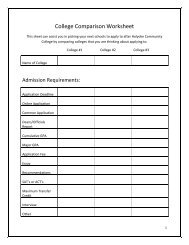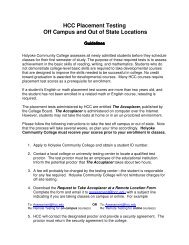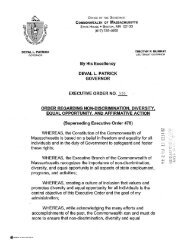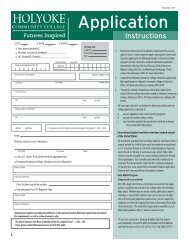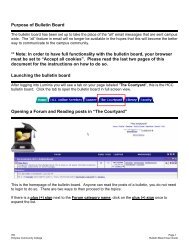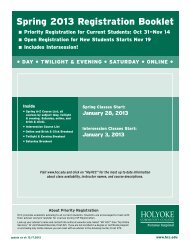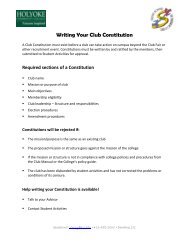eties of the world. The important role that the communitycolleges can play is profoundly dependent upon the extentto which they may draw from the full collective of intellectualresources within each college’s community of scholars,students, and administrators. Any condition or force thatimpedes the fullest utilization of the human and intellectualresources available represents a force of destructive consequencefor the development of our Commonwealth and,ultimately, our nation.<strong>Community</strong> college students, faculty, staff and visitors mustbe free from conduct that has the purpose or effect of interferingwith an individual’s academic or professional performanceand creating an intimidating, hostile or demeaningeducational or employment environment. Therefore, thecommunity colleges establish a policy of unequivocal condemnationof all forms of ethnic, religious, cultural, or racialintolerance within the 15 college communities.This policy condemns all conditions and all actions or commissions,including all acts of verbal harassment or abuse,which deny or have the effect of denying to an individualhis/her rights to equality, dignity and security in violation ofhis/her rights guaranteed under the law. The policy reaffirmsthe doctrine of civility, appreciation for pluralism and thepre-eminence of individual human dignity as preconditionsto the achievement of an academic community that recognizesand utilizes the resources of all persons, while recognizingand reaffirming the tenets of academic freedom. Thecommunity colleges recognize their obligation to protect therights of free inquiry and expression, and nothing, herein,shall be construed or applied so as to abridge the exercise ofrights under the Constitution of the United States and otherfederal and state laws.The community colleges will vigorously strive to achievediversity that is sufficiently reflective of our society.However, diversity alone will not suffice. There must bea unity and cohesion in the diversity which we seek toachieve, thereby creating an environment of pluralism.The community colleges bear a responsibility, by edict, andan obligation, by social morality, to promote understandingand acceptance of ethnic, cultural, religious and racialdiversity as we strive to create an atmosphere of dignity forall individuals and groups within our system of public highereducation. The president will take reasonable measures toprevent and discourage harassment and will act positively toinvestigate alleged harassment and to effect a remedy or resolutionwhen an allegation is determined to be valid.Sexual Assault Policy and Procedures<strong>Holyoke</strong> <strong>Community</strong> <strong>College</strong> is committed to providingan atmosphere for learning that is free of any conduct thatcould be considered harassing, abusive or disorderly. In orderto assure that the college meets its obligations to all membersof the community, the procedures and programs have beenestablished and are available in the offices of: the director offacilities, vice president for <strong>Student</strong> Affairs, dean of <strong>Student</strong>Services, Affirmative Action officer, and dean of humanresources.Sexual assault is a criminal offense. Sexual assault in anyform, including acquaintance rape, will not be tolerated.Sexual assault, as defined in the Federal Bureau ofInvestigation Uniform Crime Reporting System, includesforcible and nonforcible offenses.The Crime Awareness and Campus Security Act of 1990Section 485 (f) (1) (F) of 20 U.S.C. 1092 (a) (1) (PublicLaw 101 -542) requires that the college collect informationwith respect to sexual assault on campus and, beginning inSeptember 1993, to include such information in an annualsecurity report. The Higher Education Amendments of 1992(Public Law 102-325) provide further that as part of theannual security report the college shall include, develop, anddistribute a statement of policy regarding the college’s sexualassault programs and the procedures to be followed once asex offense has occurred.When an allegation of sexual assault is made, the collegewill encourage the alleged victim to pursue criminal prosecutionunder the Massachusetts criminal statutes. In addition,appropriate campus disciplinary action may be pursued.Sanctions for sexual assault violations may include, in additionto criminal charges, suspension, dismissal or expulsionfrom the college.All allegations of sexual assault will be handled confidentiallyand will be investigated. Both the accuser and the accusedwill have equal opportunity for hearing.Whom to ContactIn the event that you are the victim of sexual assault on thecampus, first and most importantly get yourself into a placeof safety if at all possible where you are able to call one ormore of the following:1. The Campus Police at (413) 552-2211(ext. 2211 oncampus phones) to report the incident and receiveprompt assistance.2. The local police at (413) 536-0111.3. A friend or family member.4. Abuse and Rape Crisis Hotline (Western Mass.)(413) 733-7100 or (800) 796-8711<strong>Student</strong> Rights and Responsibilities1. If a student receives a report of or discovers a possiblesexual assault on campus, he/she must immediatelynotify the campus police or the dean of <strong>Student</strong>Services. It is extremely important that these proceduresare followed to ensure that appropriate medicaland administrative services are provided. Thecampus police or dean of <strong>Student</strong> Services will beresponsible for implementing the procedures.52
2. The college and/or the alleged victim may initiatecollege disciplinary action against the personaccused of rape, acquaintance rape, or other sexoffenses, forcible or nonforcible. Possible sanctionsto be imposed following the final determination ofan on-campus disciplinary procedure regarding rape,acquaintance rape, or other sex offenses, forcible ornonforcible, may include the following: restitution,disciplinary probation, suspension, dismissal for anindefinite period, or expulsion.3. If on-campus disciplinary action is instituted, thecollege shall follow its disciplinary procedures. Thestudent code of conduct and student disciplinarysanctions are stated in this handbook.Sexual Harassment PolicySexual harassment is a form of illegal discrimination whichis defined as “unwelcome sexual advances, requests for sexualfavors and/or other verbal or physical conduct of a sexualnature which has the effect of denying equal educational oremployment opportunities.” There are two types of sexualharassment:1. Quid pro quo, in which educational or employmentbenefits are conditioned on the granting ofsexual favors. An example would be a request by aninstructor for sexual favors in return for a passinggrade; and,2. Hostile Environment claims abusive, intimidating orharassing verbal or expressive behavior which isdirected toward an individual based on a protectedcharacteristic, such as sex.Federal and state standards for determining whether a sexualharassment claim is actionable vary. There are five fundamentalguidelines:1. The individual belongs to a protected category (sex).2. The individual was subjected to unwelcome sexualharassment.3. The harassment complained of was based upon sex.4. The harassment complained of affected a term, acondition or a privilege of education or employment.5. The institution or its representatives knew, or shouldhave known, of the harassment and failed to takeprompt, effective, remedial action.<strong>Student</strong>s’ rights are protected under Title IX. It states “noperson in the United States shall, on the basis of sex, beexcluded from participation in, be denied the benefits of, orbe subjected to discrimination under any educational programor activity receiving Federal financial assistance.” [20U.S.C. 1681 (1982)]<strong>Student</strong>s who feel they have been subjected to sexual harassment,either quid pro quo or a hostile environment, shouldreport this to the Affirmative Action officer (FR 317), (413)552-2228. As an agent of the institution, the student grievanceofficer is required by law to investigate and meet withthe accused to obtain his or her version of the events. Theindividual making this claim is given the option of meetingthe accused; however, he or she is not required to do so. Theinstitution will conduct an investigation, a written warningor other appropriate disciplinary action against the accused(provided that sufficient evidence supporting the alleged victim’sallegations is uncovered) will be taken.Smoking PolicySmoking is prohibited in all <strong>Holyoke</strong> <strong>Community</strong> <strong>College</strong>buildings and currently is prohibited within 20 feet of allentryway doors. Note: this policy is subject to change in theevent that HCC becomes a smoke-free campus.<strong>Student</strong> Code of ConductIntroduction<strong>Holyoke</strong> <strong>Community</strong> <strong>College</strong> is committed to providing acollegiate atmosphere that is free of any conduct that couldbe considered harassing, abusive, disorderly, or disruptive.The college recognizes and will endeavor to protect therights of all students, faculty and staff members to be treatedwith respect and courtesy. Any behavior which may havebeen influenced by a student’s mental state (irrespective ofthe ultimate evaluation), or use of drugs or alcoholic beverages,shall not in any way limit the responsibility of the studentfor the consequences of his or her actions.All students are expected to abide by the rules and regulationsof the college and local, state and federal laws. Forcases where violations occur, policies and procedures havebeen developed to protect the rights of all members of thecollege community, individually and collectively. The proceduresdescribed below are not intended to prohibit theinvolvement of civil authorities in cases related to violationof laws.DefinitionsAccused <strong>Student</strong>: The student who is alleged to haveviolated the college’s <strong>Student</strong> Code of Conduct.Administrative Disposition: A resolution of a complaint,which is mutually agreed upon by the CCO andthe accused student. An administrative disposition shallresult in an accused student waiving his/her right to ajudicial board hearing or appeal.Appeals Officer: The person designated by the college’sPresident to hear student appeals of a judicial boardfinding. The appeals officer is the Vice President for<strong>Student</strong> Affairs.53



